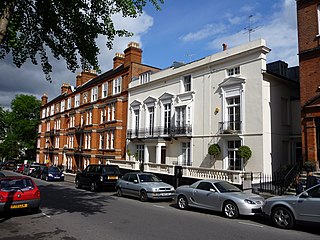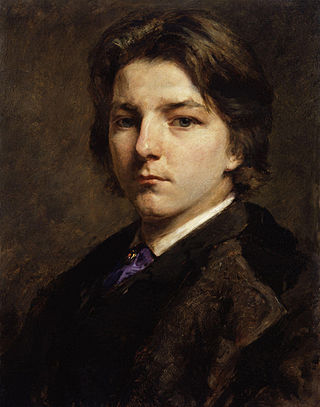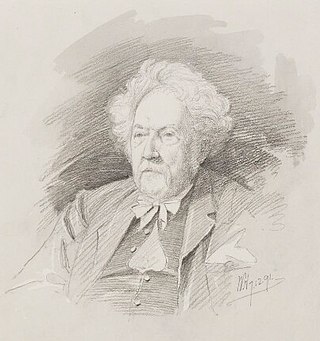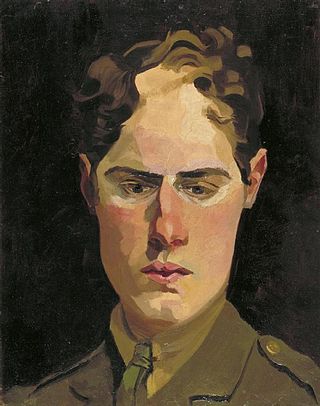
Ford Madox Brown was a British painter of moral and historical subjects, notable for his distinctively graphic and often Hogarthian version of the Pre-Raphaelite style. Arguably, his most notable painting was Work (1852–1865). Brown spent the latter years of his life painting the twelve works known as The Manchester Murals, depicting Mancunian history, for Manchester Town Hall.

Hampstead is an area in London, England, which lies four miles northwest of Charing Cross, and extends from the A5 road to Hampstead Heath, a large, hilly expanse of parkland. The area forms the northwest part of the London Borough of Camden, a borough in Inner London which for the purposes of the London Plan is designated as part of Central London.

Highgate is a suburban area of London at the northeastern corner of Hampstead Heath, 4+1⁄2 miles north-northwest of Charing Cross.

East Finchley is an area in North London, immediately north of Hampstead Heath. Like neighbouring Muswell Hill, it straddles the London Boroughs of Barnet and Haringey, with most of East Finchley falling into the London Borough of Barnet. It has the greenest high road in London.

Benjamin Lauder Nicholson, OM was an English painter of abstract compositions, landscapes, and still-life. He was one of the leading promoters of abstract art in England.

University College School, also known as UCS, is an independent day school in Frognal, Hampstead, London, England. The school was founded in 1830 by University College London and inherited many of that institution's progressive and secular views.

Swiss Cottage is an area of Hampstead in the London Borough of Camden, England. It is centred on the junction of Avenue Road and Finchley Road and includes Swiss Cottage tube station. Swiss Cottage lies 3.25 miles (5.23 km) north-northwest of Charing Cross. The area was named after a public house in the centre of it, known as "Ye Olde Swiss Cottage".

Christopher Richard Wynne Nevinson was an English figure and landscape painter, etcher and lithographer, who was one of the most famous war artists of World War I. He is often referred to by his initials C. R. W. Nevinson, and was also known as Richard.

Paul Nash was a British surrealist painter and war artist, as well as a photographer, writer and designer of applied art. Nash was among the most important landscape artists of the first half of the twentieth century. He played a key role in the development of Modernism in English art.

Francis Montague Holl was a British painter, specializing in somewhat sentimental paintings with a moment from a narrative situation, often drawing on the trends of social realism and the problem picture in Victorian painting. He was also, especially in his later years when the demand for social realism slackened, a portrait painter, mostly of official-type portraits of distinguished and therefore elderly men, including members of the royal family.

Christ's College is a secondary school with academy status in East Finchley, London, United Kingdom. It falls under the London Borough of Barnet Local Education Authority for admissions. Since September 2018, Christ’s College Finchley has offered education to both girls and boys joining Year 7. The school presently has 860 pupils and specialises in Maths and Sciences.

Norman Wilkinson was a British artist who usually worked in oils, watercolours and drypoint. He was primarily a marine painter, but also an illustrator, poster artist, and wartime camoufleur. Wilkinson invented dazzle painting to protect merchant shipping during the First World War.

Hereward House School, also known as HHS, is an Independent Association of Prep Schools (IAPS) private preparatory school for boys aged 4 to 13, located in Hampstead, London on 14 Strathray Gardens, near Swiss Cottage and Finchley Road. It prepares boys for London day schools as well as London boarding schools.

Thomas Collier RI was an English landscape painter.
Charles Bentley, was an English watercolour painter of coastal and river scenery.

Hilda Anne Carline (1889–1950) was a British painter, daughter of the artist George Francis Carline, and first wife of the artist Stanley Spencer. She studied art under the Post-Impressionist Percyval Tudor-Hart, with her brothers Sydney and Richard, and then at the Slade School of Art under Henry Tonks. She had a promising early start with her works being shown at the London Group, Royal Academy and New English Art Club.

Henry George Hine (1811–1895) was an English landscape-painter and comic illustrator.

Richard Cotton Carline was a British artist, arts administrator and writer. During the First World War, Carline served on the Western Front and in the Middle East, where he travelled extensively through Palestine, Syria, India and modern day Iran and Iraq. Although known for his depictions of aerial combat painted during World War One, from the mid-1930s, his output as an artist was overshadowed by his numerous roles in local, national and international artists' organisations. Carline held strong anti-fascist beliefs and also worked to gain appreciation for African art, naive art, child artists and even promote the artistic merits of postcard images.

Walter Percival Starmer (1877-1961) was an English artist, cartoonist, muralist, and stained glass designer.
Joan Hodes (1925–2022) was a British watercolourist and oil painter, best known for her landscapes of Britain, Ireland, and continental Europe.


















